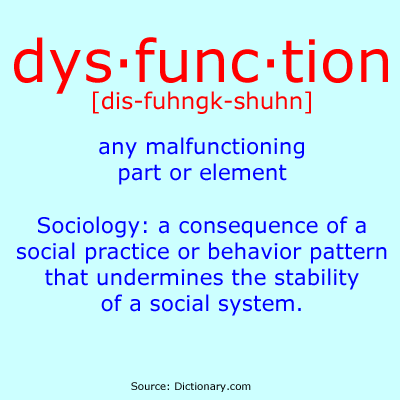
Although my investigation of dysfunction is starting with the question of evangelical dysfunction rather than the problem of evangelical dysfunction, the term “dysfunction” in the context of Christian Evangelicalism still requires a basic definition.
As I noted in an earlier post, I am distinguishing “dysfunction” from both sinfulness and brokenness. The main distinction is that dysfunction in evangelical contexts i) happens in place of what is “functional,” ii) happens in such a way that those who participate in it are largely unaware of its occurrence, and iii) is entrenched within the community context (typically a church or even a denominational context) as what I have called a “standard of faithfulness” that serves to identify membership in the community by tacitly delimiting appropriate (and inappropriate) behaviour.
Let me unpack this definition.
I am defining “sin” as an act, orientation or engagement that–whether consciously or unconsciously, actively or passively–disrupts my relationship with God by creates distance between me and God. I am defining “brokenness” as the inability–known or unknown but *never* consciously chosen–fully to engage in right relationship with God, oneself, others or our world.
1) understandings of church unity,
2) unilaterally prioritizing stability over risk-taking,
3) aggrandizing affirmation and minimizing critique or aggrandizing critique and minimizing affirmation,
5) deputized thinking / thinking by proxy,
6) beliefs that excuse the community from action, insulate the community from pain, and / or accuse the communities adversaries or accusers,
7) no attention toward / widespread ignorance concerning self-deceit,
